#three girls reading 1907
Text
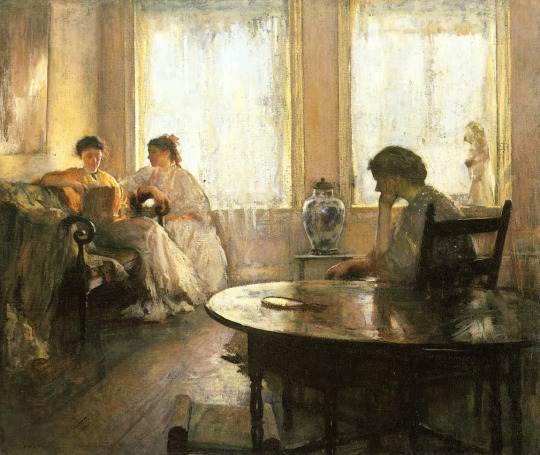
Edmund Charles Tarbell (American, 1862-1938)
Three Girls Reading, 1907
#Edmund Charles Tarbell#genre painting#1800s#1900s#art#fine art#classical art#fine arts#oil painting#american#american art#edmund charles tarbell#classic art#painting#women#woman#three girls reading 1907
53 notes
·
View notes
Photo
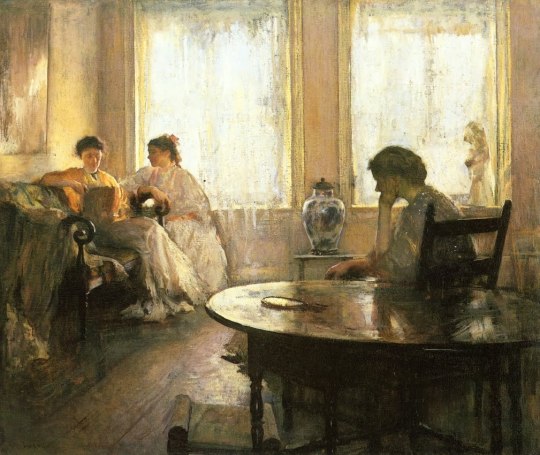
Edmund Charles Tarbell (American, 1862-1938)
Three Girls Reading, 1907
#Edmund Charles Tarbell#Edmund Tarbell#Edmund C. Tarbell#women in art#american art#1900s#early 1900s#*#fav
758 notes
·
View notes
Text
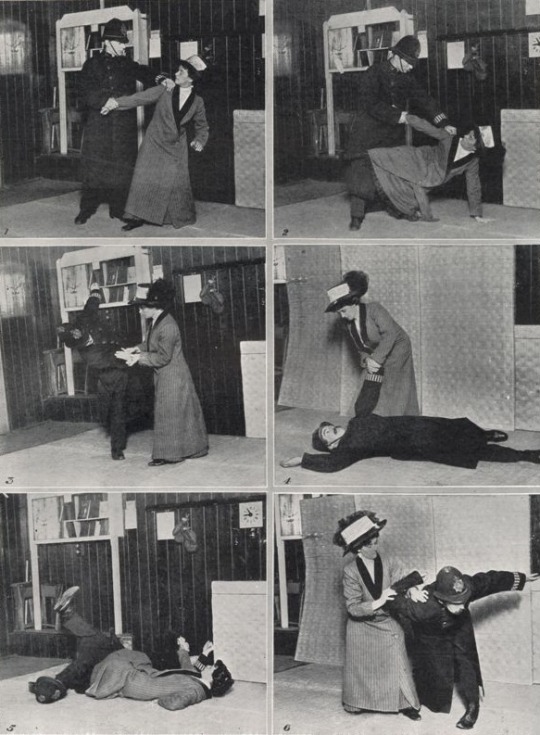
Edith Garrud - The suffragette that knew martial arts
The first British female teacher of jujutsu, Edith Garrud (1872-1971) taught the suffragettes to protect themselves.
A passion for martial arts
Edith Margaret Williams was born in Bath in 1872 and started her career as a physical instructor for girls. She shared this passion for physical culture with her husband, William Garrud, a wrestling and boxing instructor.
They came in contact with Edward Barton-Wright who had spent three years in Japan, and studied judo and jujutsu. He elaborated his self-defense techniques known as “bartitsu” and opened his club in London in 1899.
The Bartitsu Club was notably opened to women. Edith was thus able to train alongside her husband. By 1908, Edith and William became jujutsu instructors themselves with William in charge of the men’s class and Edith teaching the women and children.
Jujutsu specializes in speed, precision and the use of soft, flowing movements to deal with aggression rather than using just brute strength. The couple showcased their skills through demonstrations. In one of them, Edith defeated a male aggressor played by her husband. The sight of this 4ft-11inch (150cm) woman effortlessly throwing a much taller man greatly impressed the audience.
In 1907, Edith starred in a short film Jujutsu down the footpads in which an innocent lady overpowers two ruffians.
Vote for women
Edith took an interest in the cause of women’s suffrage. In 1909, she was invited by the Women's Social and Political Union (WSPU) to give a demonstration in the presence of Emeline Pankhurst and other leading figures of the movement. As William was ill, Edith demonstrated alone and invited members of the audience to test her skills. This included subjecting a skeptical police officer to a powerful shoulder throw.
In 1910, Edith also wrote a series of essays, advocating for the growing community of female martial artists and how self-defense could free women by giving them the means to protect themselves:
“You constantly read in the papers reports of dastardly attacks on helpless women by thieves and ruffians. A woman who knows jujutsu, even though she may not be physically strong, even though she may not have even an umbrella or parasol, is not helpless. I know many women personally who have tried the tricks I shall explain to you and come out on top. They have brought great burly cowards nearly twice their size to their feet and made them howl for mercy.”
The bodyguards
The suffragettes faced dangerous and violent situations. This was especially the case on Friday 18th November 1910. 300 WSPU members marched on the House of Parliament and faced police officers armed with batons. Women were subjected to six hours of beatings and arrests and there were widespread reports of sexual abuses.
Emeline Pankhurst thus asked Edith to train a group of women that would be known within the WSPU as the Bodyguard. Led by Gertrude Harding, they acted as agitators, disruptors and decoys.
Edith trained them in hand-to-hand combat and the use of homemade concealed weapons such as wooden India clubs and the fashioning of cardboard body armor. The suffragettes took advantage of their opponent's surprise and exploited their weaknesses.
They for instance struck directly at a police officer’s helmet to knock it from his head. Policemen were held accountable for the loss of uniform items and had to pay for their replacement. They cut the suspenders so that the policeman had to hold back his pants, blinded the police with a charge of umbrellas etc.
When told by a policeman that she was making an “obstruction” during a demonstration near the House of Commons, Edith pretended to drop her handkerchief, threw the policeman over her shoulder and disappeared into the crowd.
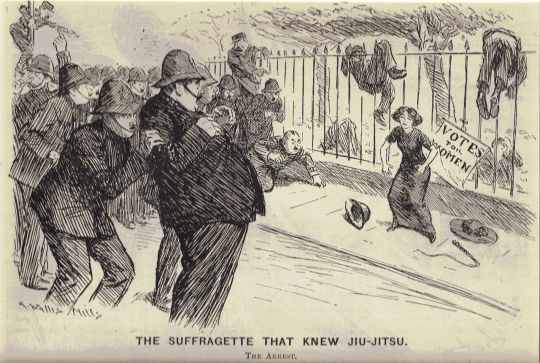
In prison, suffragettes went on hunger strikes and were subjected to force-feeding. The “Cat and Mouse Act” of 1913 allowed hunger-striking prisoners to be released and then re-incarcerated as soon as they had recovered their health. The Bodyguard thus protected and hid those women.
Edith for instance hid militant suffragettes in her dojo, telling the police not to disturb her lessons and leave her property.
A quiet retirement
Edith’s contributions to the suffragist movement ended with the beginning of the First World War. Little is known of her life afterward.
She and her husband would run the Golden Square dojo until their retirement in 1925 and retired to a quieter life. William passed away in 1960. In an interview in 1965, Edith said that her recipe for a long, happy and healthy life was:
“Self-discipline. Of course, I had to be extremely disciplined to succeed at jujutsu and hold my own with men […] but it is the mind which really has control, not only of your muscles and your limbs and how you use them, but also your thoughts, your whole attitude to life and other people.”
She died in 1971. A plaque on the building that had been her home can be seen today: “Edith Garrud 1872–1971. The suffragette who knew jiu-jitsu lived here”.
Further reading
Dorlin Elsa, Se défendre : une philosophie de la violence
Godfrey Emelyne, Femininity, Crime and Self-Defence in Victorian Literature and Society: From Dagger-Fans to Suffragettes
Kelly Simon, "Edith Garrud: The jujutsuffragette". In McMurray, Robert; Pullen, Allison (eds.), Power, Politics and Exclusion in Organization and Management
Ruz Camila, Parkinson Justin, ““'Suffrajitsu': How the suffragettes fought back using martial arts”
#history#women in history#women's history#feminism#suffragettes#20th century#edith garrud#martial arts#jujutsu#jiujitsu#england#english history#herstory#women in martial arts#historical figures
101 notes
·
View notes
Text
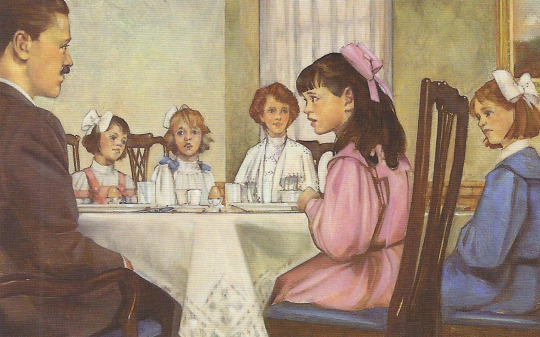
A lot of people have questioned how likely it would have been for a wealthy couple like Uncle Gard and Aunt Cornelia to adopt three orphan girls who weren't family members.
What's really fascinating is that in 1907, The Delineator, a popular fashion magazine in the 1900s, published an article on orphans in New York city, who grew up without the attention and love of family due to being raised in institutions, putting them on the path to become immoral adults.
The article had a response that the editors were not expecting - readers wanted to adopt the children! The attitudes towards orphans were different too - the women who wrote to the magazine were hoping to raise these children as their own children, not use them as labor in their homes. The idea of motherhood was also changing - women who had never given birth asked that they be equally respected as mothers as those who had. From then on, as part of the Child-Rescue Campaign, the magazine published brief biographies of orphaned children who could be adopted.
More than two thousand children were adopted through the Child-Rescue Campaign, which lasted from late 1907 to early 1911.
This campaign is a little more complex than I can explain here, so if you're interested, I encourage you to read the essay I sourced the information from. It's available to read for free on HathiTrust.
(Information adapted from Rescue a Child and Save the Nation
The Social Construction of Adoption in the Delineator, 1907-1911 by Julie Berebitsky, printed in Adoption in America: Historical Perspectives edited by E. Wayne Carp)
291 notes
·
View notes
Text

Lucien Victor Alexis (1887-1981)
Not very much is known of Lucien Alexis’ early childhood in New Orleans, but what is known are the achievements he would make in later years to come. Born on July 8, 1887 to Louis Victor and Alice Saucier Alexis, he was educated in the local schools where he excelled academically. Alexis was determined to attend Harvard University. Not having the finances to do so, he began working in 1907(at the age of twenty) as a railway mail clerk, saving for the education he so desperately desired.
By the time he reached twenty-seven, he had set aside enough money for four years of college. He applied and was accepted at Harvard but was asked to attend (for one year) Phillips Exeter Academy in New Hampshire, a prestigious preparatory high school. While at Exeter, he lived in the home of Mr. H.F. Quimby and soon developed a keen interest in foreign languages and the sciences. By now he had only enough money for three years upon entering Harvard, so he managed by graduating “cum laude” a year early (1917). It was there, at Harvard, that he earned the nickname: “The Negro Einstein.”
That same year, Alexis entered Officers’ Training School in Des Moines, Iowa and was commissioned as a 1st lieutenant and assigned to the 367th Infantry on October 15, 1917. World War I was raging in Europe and Alexis sailed for service in France on June, 1918. Two months before departing, Alexis married Rita Holt in Gulfport, Mississippi and together they would have one son, Lucien Victor Alexis Jr.
Upon returning to New Orleans, Alexis took up the profession of teaching. He was assigned to McCarthy Elementary in 1921 and appointed Assistant Principal in 1923 at Willow Elementary. But his greatest reward came in 1926 when he became principal of McDonogh #35, the only public high school opened for the education of colored students in the city of New Orleans. For the next nearly 30 years, he would leave an indelible mark on this institution which is still being echoed by many of his formal students up to the present day.
“It was not unusual to spot our principal walking up and down the corridors of the Rampart Street School reading scientific works printed in German. Noted for his mastery of Latin, he often found time to instruct advanced classes in the subject.” (Class of 1936)
Other graduates affectionately tell stories of his successful administration but also his dreadful “army”. Being a former military man, Lucien was said to be strict but fair as well as famous for his method of disciplining students. Students who violated his dress or discipline code were forced to join Alexis’ “army” and ordered to march up and down the second floor of the school building.
Respect for Mr. Alexis soon extended beyond the school grounds and into the community. Since McDonogh #35 was located on South Rampart and Girod Streets, the students had to pass through a neighborhood of sleazy bars, houses of prostitution and various other vices. Often the girls were meddled by men on the way going and coming from school. Fortunately, once it was known that you were an “Alexis” girl, you were never meddled again. They respected Mr. Alexis and knew to show respect to his students.
The “Negro Einstein” did not give up his interest and love for science once he became principal. For five years he engaged in serious scientific study and soon published a 40 page brochure outlining his principles of a new theory which he termed his “ethonic” theory.
From 1929 to 1937, he published the following scientific articles: Fundamentals in Physics & in Chemistry, The Thermo-Electric Formula, The Riddle of the Magnetic Field, An Empirical Disclosure of the Fallacies of Relativity, A Counter-Deduction from Bent Alpha Tracks, Radiations-Their Loci of Travel and Their Loci of Origin, The Co-Origin of Gravity&Cosmic Rays, Simple Formulae for Measuring Atoms, Their Speed, and the Speed of Light.
Upon retirement, the brilliant educator and published author opened Straight Business School on North Claiborne near Esplanade Avenue and Mrs. Alexis basically ran it. Lucien Alexis also was president of the Supreme Industrial Life Insurance Company, founder and executive director of the School of Post-Modern Science in New Orleans, and a charter member of Sigma Lambda Chapter of Alpha Phi Alpha Fraternity.
Alexis also spent a great deal of time on his favorite hobbies at home. On the 25th Anniversary of his graduation from Harvard, he told the Harvard press of these hobbies:
“Don’t interfere with my physics and chemistry, which I have raised from the ignoble position of a hobby into the dignified status of a science. Don’t interfere with my Italian which I have picked up since leaving you fellows. Don’t interfere with my German, my French, or my Spanish which I have kept plugging at. These are my near hobbies. You may interfere with my gardening and my frequent efforts at directing operettas, especially the Gilbert and Sullivan ones, for there you are in the field of real hobbies of mine.”
Lucien Alexis passed away December 18, 1981. He is buried in the family’s tomb in St. Louis Cemetery No.3.
#african#afrakan#kemetic dreams#africans#brownskin#brown skin#afrakans#lucien alexis#science#alpha phi fraternity#german#french#spanish#new orleans
96 notes
·
View notes
Text
Till Death Do Us Part – An Arthur Morgan x OC Story *PART TWO*
Content Warnings – Kidnapping, Death Threats, Micah Bell, Trauma, Angst, Character Deaths, Eventual Happy Ending (not in this part), Reference to torture, reference to sexual assault, not described, one brief mention of both
Word Count – 1.7k
Part One - 1.3k words (17th July 2024)
Part Two - 1.7k words (17th July 2024)
Part Three - 1.2k words (19th July 2024)
Authors Note – I’m so sorry for the confusion of Bonnie the horse and Bonnie MacFarlane in this – my horse irl is a Belgian draft, and I thought it would be cute to put her in this but it just ended up confusing lmao
-x-
7 years later
February 16th, 1907
I found this old journal today while looking through my Arthur’s things. Me and Bea moved into our new home about 6 months ago now, and I finally had the chance to sit and go through all of our old belongings. I found Arthur’s journal, and after spending a few days crying over his sweet notes, all his loving words about me etched delicately with his careful script, I decided to start sharing my own thoughts. Share my problems to someone other than Bea or Bonnie.
We now live on a ranch, west of Blackwater. God it feels strange to be back in this area again. After leaving Abigail and the others in Oregon all those years ago (I miss them all so much), myself and Darcy, my sweet girl, headed across the country to find somewhere safe to have my baby. We settled in North California, just on the border. While the busier state was helpful for delivering my baby, my country soul could not cope and we soon continued south. Hopping from place to place, we have finally found a home. Its been a lonely few years, and I haven’t seen Abigail or any of the others since those fateful days. As far as John and the others know, I either ran away or died out on the trails. It breaks my heart to break theirs, but needs must.
As I said, we now live on a ranch west of Blackwater - MacFarlane’s Ranch. While Bea is cared for my some of the local ladies, who enjoy teaching her to read and write, I spend my days in the corral, training the horses that the owners of the ranch bring in. I can still remember the days when my Arthur first taught me to ride, all those years ago. And now here I am, teaching horses how to take care of their riders, teaching young fillies and colts all the groundwork to set them up for life. I’m quite a horsewoman nowadays!
Speaking of horses; my sweet Darcy was retired 2 years ago now, and I have managed to organise for her to have her own paddock on the ranch to live out her days. I know that retiring a horse ain’t all that common round here, but Miss MacFarlane seemed to have a soft spot for my sweet mare. My heart genuinely aches when I bring her in from her paddock to check her over, and my sweet Bea runs over to see her, clamouring to ride. I allow her to sit on her while I walk back to the field, but that is all. She has the passion for horses that her daddy had, and that I’ve tried to continue for him.
My new horse is a stunning and versatile red roan Belgian Draft mare named Bonnie - I purchased her from a fellow in Montana at the same time as retiring Darcy, so I can promise that her having the same name as Miss MacFarlane is pure coincidence! Bonnie (the horse, that is) is such a perfect mare for my little family - she can drive us to the local town with the wagon, and also allow me to use her to ride, and even teach Bea to ride! I thought I’d struggle finding a horse as perfect as Darcy, but Bonnie sure ain’t that far off. Although, have a horse as stocky as a draft horse after years of riding a fine thoroughbred is definitely a difference!
I truly hope we can find happiness here.
Florence Morgan
-x-
On the 25th May, 1900, Beatrice Abigail Morgan was born in the state of California, to Mrs Florence Morgan. And now, at nearly 7 years old, the two of you had settled down into the ranching lifestyle, with Bea finally given the chance to go to a proper school and learn to read and write.
Whilst life hadn’t been kind to the either of you over the past few years, you truly felt you’d found a place you could finally settle in. MacFarlane’s Ranch was a simple but efficient farm, with a well established cattle and equine business. While the men handled the cattle, a position had opened up in the training and husbandry of the horses; when you saw the role in the papers, you had nearly screamed. Especially when you saw the gleaming words “house available for successful applicant”. It was practically made for you.
Now, your days consisted of waking up early; avoiding waking up Bea; feeding all the horses in the stables; sneaking back home; giving Bea her breakfast and sending her off to school with Mrs Nelson across the road; backing, exercising, and being thrown off countless different horses; ideally selling a couple to clients; before collecting Bea and preparing dinner before bed.
A simple enough life, but busy enough to keep your mind free from the ghosts of your past.
Free until nightfall, that is. That is when your mind filled with panic, dread, and guilt. Guilt for your husband, being left alone all those years ago to die to the hands of Micah Bell. You never got to visit his grave - as far as you know, he never got one. Dread and panic at the sickening gut feeling you had in the base of your stomach that something would happen; and soon. Years of running and fighting finally catching up with you.
-x-
You were used to waking up in a cold sweat, but tonight was different, your fears felt more daunting, more real – you awoke, gasping from the night terrors that plagued you, trying to steady your breathes and keep Bea asleep, her small body in the room next to yours. As your panicked gasps subsided, you swung your legs out of your cot, a daunting weight sitting heavily on your shoulders. As your eyes adjust to the darkness in your room, you glance at the clock. Despite feeling like you had been trying to fall into a sleep for hours, it was barely 1am.
A deep sigh left you as you stood, taking yourself into your small kitchen to pour yourself a mug of water. Standing at the window, you glance outside towards the corral, a small smile etching itself onto your face when you spot Bonnie led down, fast asleep. You envied her.
Looking past the corral, you spotted a group of pale, flickering lights – lanterns, you thought – moving swiftly towards the ranch. This wouldn’t be the first time bandits attacked the ranch, and would likely not be the last. You sigh, this must've been the gut feeling you had minutes before. Before the lights could get any closer, you grabbed your coat, covering your chemise, and shoved your feet into your boots. You picked up your Lancaster Repeater, the one Arthur used and lovingly cared for until passing it onto you, and dashed towards the MacFarlane’s farm house.
Hammering on the door, adrenaline rushed through your veins as you waited for the family to wake up. A shadowed figure appeared in the doorway of the farm house. “Florence? What’s goi-”, she stopped, realisation spreading across her face as she spotted the threat approaching the ranch. She grasped her rifle by the door, a serious expression setting in her face.
A fight was on your hands
-x-
The attackers had shocked you, at first. Whilst there were various casualties, they had not come in guns blazing, seemingly searching for something rather than being out for the kill. Their masked faces surveyed the area, before one man – which hauntingly familiar eyes - stopped on your figure, hidden slightly behind a cart in front of the corral. He stopped, and stared, before nodding at something behind you.
Next thing you knew, a pair of greasy hands wrapped themselves around you, one of them covering your mouth, the stench filling your nostrils, the other bringing a knife to your throat. Bonnie gave you a panic stricken look, her eyes darting over to your homestead. Big mistake. The man holding you spotted this look, and chucked – a sneer that you’d never thought you’d have the displeasure of hearing again.
“Go get her brat, Dutch.”
2 months later
As if life hadn’t been hard on you already for as long as you could remember, the past few weeks were just the cherry on top. After being kidnapped by Micah Bell, you were beaten, tortured, and taken advantage of on an almost daily basis. Fed the bare minimum to survive. As much as your blood boiled with anger when you saw the face of Dutch Van Der Linde, you had to thank him. He was able to keep Micah and his men away from Bea, a soft look appearing in his eyes whenever he laid eyes on her.
Although you hoped that you could sense the guilt when he glanced at you, he couldn’t bring himself to keep them away from you as well.
When you first realised it was Dutch seemingly orchestrating the attack on MacFarlane’s Ranch, you saw red – but could do nothing about it. Micah pressed the blade closer to the skin of your neck, breaking through the first few layers as you hissed in pain under his hand. Dutch turned towards your house, coming back out minutes later with a trembling Beatrice Morgan. But he looked pained.
Now, after being captured and tortured for the past few months, you knew that Dutch was as trapped as you were. Whilst you held no true sympathy for him, you knew that he did not take a part of your capture willingly.
As the days went on, you slowly begun shutting down, loosing any hope of rescue. You knew that Bonnie and her father, the sweet family that they were, would’ve tried to find you at first, but you also knew it was a helpless task. After taking you from the ranch, the group had travelled west, settling in western Texas for a few weeks. They had then moved east again, back towards New Hanover – but for some unknown reason decided to settle in the mountains of Ambarino.
Heavy snow and biting cold plagued you every day, as you clutched onto Bea, giving her the scraps of any food you were scarcely given, trying to have her eat as much as she could. Even Dutch sneaked her a few thinning blankets on one particularly frigid night. You were at a true loss of what could be done. Until one fateful morning, a gravely, and scarily familiar voice rang out from the mountains outside.
“Micah, if you’re in here, come out”
-x-
Thanks for reading, please like, comment and reblog <3
#rdr2#red dead redemption 2#Arthur Morgan#dad! Arthur Morgan#dad!Arthur Morgan#rdr2 x oc#rdr2 daughter#Arthur Morgan daughter
9 notes
·
View notes
Text
Too many books came in at the same time from my library queue, so @redheadgleek suggests a poll and yes, let’s poll! Y’all can see my… varied reading interests lol
What should I read next?
Daughter from the Dark: Late one night, fate brings together DJ Aspirin and ten-year-old Alyona. After he tries to save her from imminent danger, she ends up at his apartment. But in the morning sinister doubts set in. Who is Alyona? A young con artist? A plant for a nefarious blackmailer? Or perhaps a long-lost daughter Aspirin never knew existed? Whoever this mysterious girl is, she now refuses to leave.
The Brilliant Life of Eudora Honeysett: Wanting to organize an assisted death on her own terms, world-weary octogenarian Eudora Honeysett forges an unexpected bond with exuberant ten-year-old Rose, who drags her to tea parties, shopping sprees, and other social excursions.
Flesh and Bone and Water: André is a listless Brazilian teenager and the son of a successful plastic surgeon who lives a life of wealth and privilege, shuttling between the hot sands of Ipanema beach and his family's luxurious penthouse apartment. In 1985, when he is just 16, André's mother is killed in a car accident. Clouded with grief, André's father loses himself in his work while André spends his evenings in the family apartment with Luana, the beautiful daughter of the family's maid. Three decades later, and now a successful surgeon himself, André is a middle-aged father, living in London, and recently separated. One day he receives an unexpected letter from Luana, which begins to reveal the other side of their story, a story André has long repressed.
Geek Love: The Binewskis are a carny family whose mater- and paterfamilias set out-- with the help of amphetamine, arsenic, and radioisotopes-- to breed their own exhibit of human oddities. There is Arturo the Aquaboy, who has flippers for limbs and a megalomaniac ambition worthy of Genghis Khan. Iphy and Elly, the lissome Siamese twins. Albino hunchback Oly. And the outwardly normal Chick, whose mysterious gifts make him the family's most precious-- and dangerous-- asset. As they set out across the U.S., family values will never be the same.
Same Bed Different Dreams: March 1919. Far-flung Korean patriots establish the Korean Provisional Government to protest the Japanese occupation of their country. This government-in-exile proves mostly symbolic, its petitions ignored by heads of state as Korea's nationhood is erased. After Japan's defeat in World War II, the KPG dissolves and civil war erupts, resulting in the North-South split that remains today. But what if the KPG still existed now, today-working toward a unified Korea, secretly harnessing the might of a giant tech company to further its aims?
Unholy: why white evangelicals worship at the altar of Donald Trump: Fueled by an anti-democratic impulse, and united by this narrative of reverse victimization, the religious right and the alt-right support a common agenda--and are actively using the erosion of democratic norms to roll back civil rights advances, stock the judiciary with hard-right judges, defang and deregulate federal agencies, and undermine the credibility of the free press. Increasingly, this formidable bloc is also forging ties with European far right groups, giving momentum to a truly global movement forecasted to last long after the Trump era.
Comemadre: In the outskirts of Buenos Aires in 1907, a doctor becomes involved in a misguided experiment that investigates the threshold between life and death. One hundred years later, a celebrated artist goes to extremes in search of aesthetic transformation, turning himself into an art object.
I Who Have Never Known Men: A young woman is kept in a cage underground with thirty-nine other females, guarded by armed men who never speak; her crimes unremembered... if indeed there were crimes.
Road of Bones: Kolyma Highway, otherwise known as the Road of Bones, is a 1200 mile stretch of Siberian road where winter temperatures can drop as low as sixty degrees below zero. Felix Teigland, or "Teig," is a documentary producer, and when he learns about the Road of Bones, he realizes he's stumbled upon untapped potential. Accompanied by his camera operator, Teig hires a local Yakut guide to take them to Oymyakon, the coldest settlement on Earth. Teig is fascinated by the culture along the Road of Bones, and encounters strange characters on the way to the Oymyakon, but when the team arrives, they find the village mysteriously abandoned apart from a mysterious nine-year-old girl. Then, chaos ensues.
22 notes
·
View notes
Text
What's with the retcons in RDR2?
There are a lot of retcons in RDR1 and RDR2. Something that bothers me that a lot of what John says about the circumstances that leds him to leaving the gang in RDR1, feels like it was retconned in RDR2.
To start out simple, John going to New Austin. In the first game, John tells Bonnie that he and his gang never went to the New Austin state. While true for the gang (except for Dutch and Hosea), John has canonically been there twice, once with Sadie and once with Jeremy Gill.
John also tells Bonnie that he has been farming for three years (1908). The GOTY guidebook for RDR1 states that he has been trying to farm for three years. Yet in RDR2, he gets his farm in 1907.
John asks what Tumbleweed is, despite RDR2 allowing him to be a bounty hunter for the sheriff. How can Tumbleweed even become that dilapidated in only 4 years from RDR2 to RDR1?
The mess that is the Armadillo plague. You'd think something as big as a Cholera outbreak and burning bodies would have been news worthy in the events of the first game. I don't remember Cholera being mentioned in the first game, if it was I don't believe it was to the extent of what RDR2 portrayed it as.
The MacFarlane barn is not there in RDR2, despite Bonnie telling John that her father built the barn when she was a little girl. Even if you say that the New Austin map was made for 1899, that would make her 15, hardly qualifies for a little girl.
In the first game, a couple of newspapers mention that Dutch was thought to have died in a fire after a bungled robbery in 1906. Yet in RDR2's epilogue, which takes place in 1907, this bungled robbery is not mentioned. The newspaper also mentions that he has been on the run since 1899 and that law enforcement is still searching for him, even though he is thought to be dead according to the first game.
The Strange Man implies that the robbery where Dutch shoots the girl was the same robbery John got shot and left behind on, judging by the tone of his voice when he says "same one you got shot on". Yet in RDR2, the ferry robbery happened at the beginning of the game, and John was left behind during a train heist.
John tells Landon Ricketts about an event where Dutch went out and "shot a bunch of people unfair like". This event is never seen nor mentioned in Red Dead Redemption 2.
During "Gates of El Presidio", John's says something to Javier along the lines of "What you and Dutch did was wrong, and the way you left me was wrong". Not "You left me and that was wrong" but "What you and Dutch did was wrong". What exactly did Javier and Dutch do? Did it have anything to do with the event above?
In the same mission, Javier alludes to John's daughter by saying "I hope you, your wife and your children rot in hell", suggesting that she was alive during John's time in the gang. She is never seen nor mentioned in RDR2.
John implies that no one in the gang cared for him and that they left him as soon as they had the chance. John even tells Landon Ricketts that "they all gone crazy anyhow". Yet in RDR2, Arthur and Sadie help John and his family get out of the gang and Charles even helps John build the house in Beecher's Hope. Hell, Hosea cared for John like a father and tried to get John to leave with Abigail and Jack. John even left on good terms with Pearson(unless you rob him, you sick bastards) Mary-Beth and Tilly. They only gang members who opposed John were Micah, Dutch, Bill, Javier, and if you stretch it, Joe and Cleet.
The wiki for the Blackwater Massacre states that 37 people died during the massacre, 22 outlaws and 15 police/civilians. However, I read all the newspapers in the first game, the only references to the massacre are from the articles concerning Landon Ricketts, who survived the massacre.
Javier's complete change in character. In every returning character, there are shades to who the character would become. Dutch was always crazy and Bill is...Bill. But Javier seems completely different. He's loyal, he's charismatic. He's a drip god and he's so likable. That's not like Javier in RDR1. Javier in RDR1 is a coward who will sell anyone out and stab them in the back for his own freedom and we don't see any hint of that in the Javier in RDR2. Yeah he changed after Guarma. But he was still loyal to Arthur and John, to the point that his voice actor adlibbed to not have Javier pointing his guns at Arthur and John.
John and Abigail's daughter. In RDR1, John mentions he had a daughter. Originally I assumed that John and Abigail had her sometime after leaving the gang and before heading to Pronghorn ranch because of the distinct name of John's Thoroughbred "Rachel" but that's not the case because there's a tease after we beat the game of the daughter, yet somehow Javier somehow knows about their daughter.
Let's not even get started on the graphical error that is epilogue John Marston "look at how they massacred my boy"

#Red Dead Redemption#Red Dead Redemption 2#John Marston#Abigail Marston#Dutch Van Der Linde#Javier Escuella#Bill Williamson
20 notes
·
View notes
Text
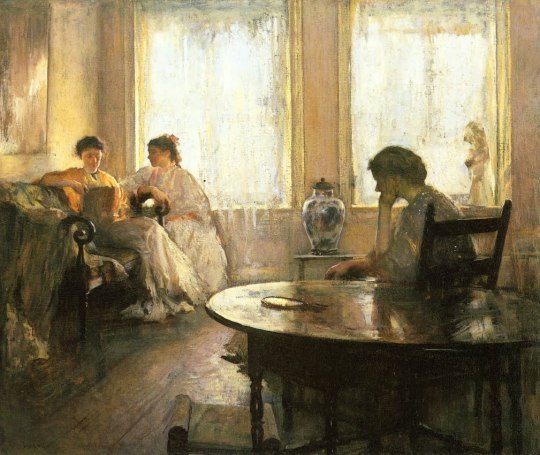
Edmund Tarbell, "Three Girls Reading" (1907)
via wikimedia commons
#edmund tarbell#art#fine art#painting#paintings#20th century art#20th century artist#20th century painting#women in art#edwardian art#edwardian era#1900s#1907#impressionism#american impressionism#american art#american artist#art history#e
20 notes
·
View notes
Text
Some scenes from the book I'm writing, brought to life through Dall-e 3
These are extremely specific but it's because I want it just how I picture it in my head. Surprisingly, a lot of these came out perfectly. You don't know how wild it is to see your writing come to life through a (computer generated) painting.
A few things you need to know…
My book is about a teenage boy in 1907. His name is John Weston, but everyone calls him Wes. He sells newspapers for his living and lives on the street. He saves the life of an old man named Tom, but the Tom also kind of saves his life too. An old woman named Mrs. Krall, who is writing a book, teaches him to read. He meets a girl named Alice and they fall in love.

A rough, impressionistic oil painting of a tall, teenage boy with brown hair. The teenage boy is poor and wears a coat. The teenage boy has a small smile. It is set in 1900 New York City. It is late autumn. (This might be what Wes looks like)

A rough impressionistic oil painting of a poor, tall, older teenage boy sitting and reading a thick book. His chin rests on his hand. He is very focused. Set in 1900. (Wes learning to read)

A bold, rough, impressionistic oil painting of a group of 4, tall, teenage boys in coats in a New York City street in 1900. The teenage boys are chatting and laughing. 2 teenage boys smoke cigarettes. 1 Teenage boy holds a stack of newspapers under his arm. It is late autumn. (This is Wes and his newspaper friends)
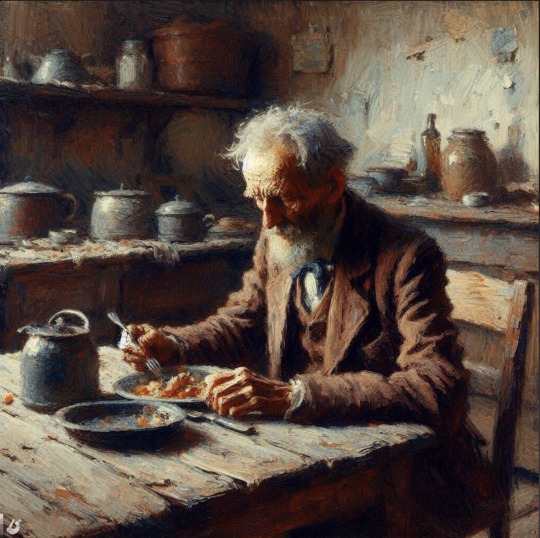
A rough, impressionistic oil painting of a thin, withered old man in an old brown suit. He sits with his elbows on a wooden table in an old kitchen in the evening. he is finishing his dinner. it is set in 1900. (Tom eating dinner)
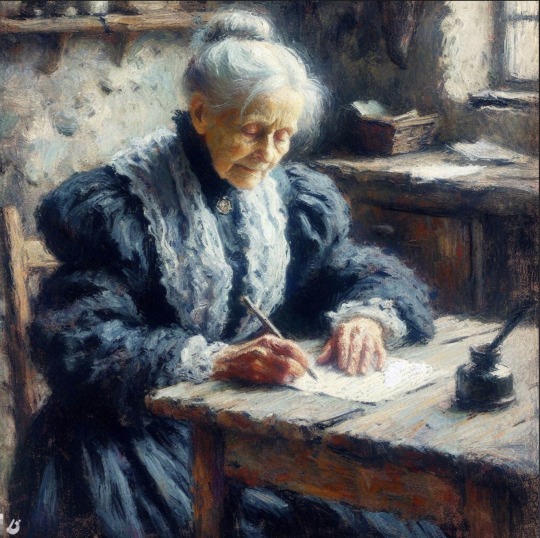
A rough, impressionistic oil painting of a small old lady in dark blue dress and big light gray shawl. The old lady's white hair is in a bun. She sits at a wooden table in an old kitchen in the early morning. She writes on paper with a dip pen. it is set in 1900. (Mrs. Krall, though I'm not fully satisfied with her yet. She's proved very hard to describe. The software kept trying to give her beards :)

This is Alice, who Wes falls in loves with. Can you blame him?(A rough, impressionistic oil painting of a young woman with dark red hair that is tied back with a green ribbon. The young woman is poor and wears a coat. It is set in 1900 New York City. It is late autumn.)
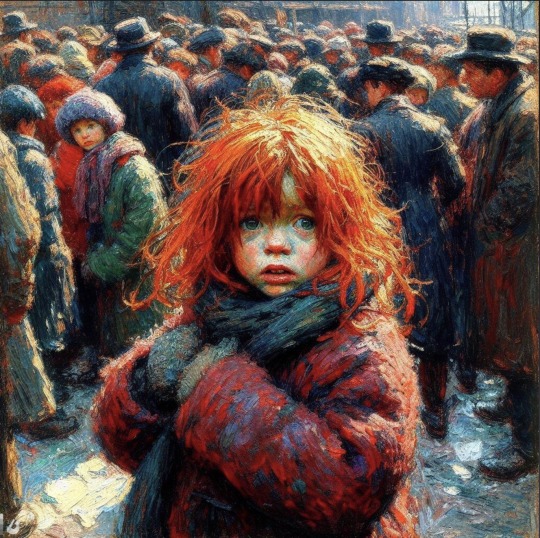
Poor little three year old Alice, immigrated from Ireland at three years old. She's alone because her parents died on the voyage. (A bold, rough, impressionistic oil painting of a three year old girl with bright red hair. The girl is scared and unattended on a cold, crowded dock in New York, 1900.)
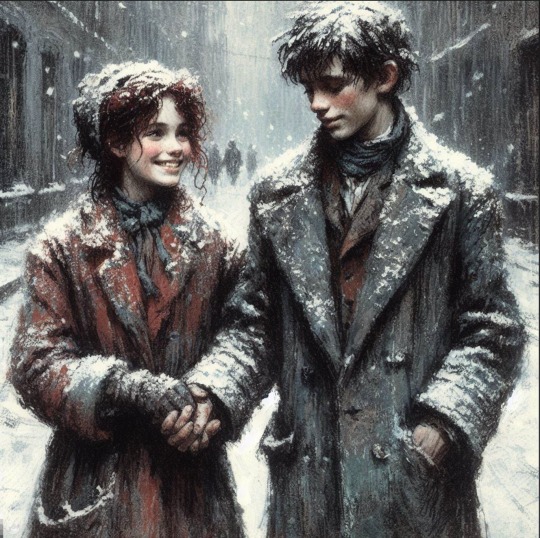
Alice looks too young here but I just can't get enough of this little tableau. HOW CAN A COMPUTER CAPTURE HUMAN EMOTION? HOW DOES IT UNDERSTAND LOVE? HOW??? This is the first time the image generator gave me an idea. What I think happened is that they were walking together and she took his hand and smiled at him. They've never held hands before. He's still processing it :) (A rough, impressionistic painting of a poor young woman with dark red hair and a poor, tall teenage boy with brown hair. The young woman and the tall teenage boy both wear old coats. The hold hands and smile in a cold, snowy city street at night. It is set in 1900.)
Hope you enjoyed! More to come!
Let me know if you want to read my book when I'm finished!
#dark acadamia aesthetic#dark academia vibes#dark academia#light academia#bing image creator#chaotic academia#classic academia#dalle3#bing image generator#writing#writers on tumblr#writeblr
3 notes
·
View notes
Text

January 2023 Wrap-up: 1900s (+ pre-1900s)
The first month of the Reading Through the Decades challenge has blown past, and it’s time to wrap-up the first decade: 1900-1909 (+ the turn of the century in general).
(You can read more about the challenge on my post introducing the challenge. Basically, Reading Through the Decades is a year-long reading challenge where we read books - and explore other media - from the 1900s to the 2020s, decade-by-decade.)
What I Enjoyed This Month

📖 Gloriana; or, The Revolution of 1900 (1890), Florence Dixie
-> A highly intelligent and enterprising young woman disguises herself as a man and becomes a Member of the British Parliament. She leads a revolutionary women’s movement, but encounters trouble when she’s falsely accused of murder.
-> Apparently, there was a huge rage of utopias written in the late 1800s?? And no one told me??? I have about a half a dozen other ones on my TBR list now, but I decided to start with Gloriana because it’s written by a woman and it’s about women’s rights. And there is an epilogue set in 1999! (I love reading stuff that shows that “everyone thought like that back then” and “people back then just didn’t know better” are talking out of their ass. A multitude of values and opinions has always existed among people. From any era, you will find a person who spoke out against injustices of that time.) Anyway, Gloriana is a fascinating look at debates and themes that were topical during the early women’s movement. Although, to my liking, there’s a little bit too much emphasis on militarism (and imperialism).
��� Emily of New Moon (1923), L.M. Montgomery
-> The first book in the three-book Emily of New Moon series about a Canadian orphan girl growing up around the turn of the century and working towards her dream of becoming a successful author.
-> Everyone seems to be all about Anne of Green Gables, but my childhood favourite was Emily of New Moon. I read it over and over again in Finnish when I was a kid, and for a while now I’ve wanted to come back to it in the original English. The reading experience definitely lived up to my memories. It’s always interesting to go back to childhood favourites and recognise the ways in which they have shaped you as a person.
📖 גאט פון נקמה (1907; God of Vengeance), Sholem Asch
-> This is a play, originally written in Yiddish, about “a Jewish brothel owner who tries to become respectable by commissioning a Torah scroll to be written. Meanwhile, his daughter has a lesbian affair with one of his prostitutes downstairs.”
-> A very interesting, short play that on the surface feels quite ordinary (thematising bourgeois aspirations and hypocrisies). Yet there’s also blasphemy and lesbianism (the love scene between the girls is very cute and romantic and features a kiss!), and definitely a lot to bite your teeth into if you’re interested in queer history. The cast of the first English-language production got arrested and sued for obscenity in 1923 (the verdict was overturned after a two-year battle).

📺 The Nevers (2021-), created by Joss Whedon
-> An epic steampunk sci-fi drama about a group of people, mostly women, known as the Touched, who suddenly manifest unusual abilities (due to alien intervention). Set in London, 1899.
-> I’m a huge fan of historical sci-fi and fantasy, and the first 6 episodes of this series are amazing! The series is women-led, the focus is on the marginalised of society, and it’s all just pure fun, excitement, and mystery. (Sadly, this show was cancelled last December, although apparently the second half of the season is already filmed and might be streamed on another platform. I do hope they find somewhere to release the rest of the episodes, because this is a delight to watch and I am so curious to see what would happen after the sixth episode.)
🎬 Сере́бряные коньки́ (2020; Silver Skates), dir. Michael Lockshin
-> An epic period romantic adventure film set around Christmastime in 1899. Matvey, the fastest courier on the frozen canals of Saint Petersburg is recruited by a group of pickpockets working the winter markets.
-> A charming love story, which I found surprisingly good, although the workers’ rights side-plot/theme kind of got sidelined in the end imo. A very beautiful, atmospheric film to watch during winter.
📺 Picnic at Hanging Rock (2018)
-> An Australian mystery romantic drama TV show. On Valentine's Day, 1900, three students and their governess from a school for young ladies mysteriously vanish. Their disappearance leaves a devastating impact on students, staff, their enigmatic and formidable headmistress and the township at large. Theories abound, secrets are exposed and hysteria sets in.
-> Queer extravaganza and mystery. WOMEN. Natalie Dormer as the mysterious and morally questionable headmistress! This was definitely my favourite thing this month, and I am planning to pick up the 1960s book this is based on asap. I go feral over stories about women trapped in a restricting society, longing to be wild and free.

📖 The Complete Sherlock Holmes (1887-1927), Arthur Conan Doyle
-> Short stories and novellas about the iconic “consulting detective” and his sidekick, set between the 1880s and 1914.
-> The Complete Sherlock Holmes has been my forever project for the past five years. I started it in January 2018, and I finally finished it this month. It has definitely been fun to read it in bits and pieces, reading one story now and then before bed. If TV is more your cup of tea, I highly recommend Granada Holmes.
📖 Imre: A Memorandum (1906), Edward Prime-Stevenson
-> “A little psychological romance" about two men who meet at a cafe in Budapest, Hungary. Oswald, a 30-something British aristocrat, and Imre, a 25-year-old Hungarian military officer, feel an immediate kinship and closeness and soon realise that the other is what they have been looking for their whole lives. (SPOILER: There’s a happy ending.)
-> What a book! I love reading obscure, forgotten-by-the-general-public works from the past. This contains a lot of musings about being queer, and really pointedly affirms the existence and validity of queer people and queer feelings in the world and throughout history. There’s not much going on plot-wise, but this novel is simply wonderful.
📖 The Soul of Man Under Socialism (1891), Oscar Wilde
-> An essay in which Wilde expounds a libertarian socialist worldview and a critique of charity.
-> I love The Picture or Dorian Gray and it has long been a goal of mine to read more of Wilde. This was a fascinating essay; a lot I agree with, a lot I disagree with. I whole-heartedly concur that a big problem is that people in a capitalist society do so much to treat the symptom but not the cause, and we can only get rid of stuff like poverty by reconstructing society, i.e. going to the root of the problem.
🎶 Claude Debussy: Clair de lune (1905)
🎶 James Weldon Johnson and J. Rosamond Johnson: Lift Every Voice and Sing (1900/1905)
4 notes
·
View notes
Text
ok im done with the gay cops now cause im getting really sad and jealous of them your honor. i wanna have gay sex with a coworker too. gonna read this book to forget my sadness. im really questioning if its worth the read cause whoever translated it didnt seem to even check for spelling mistakes, and also there was like a pedo in the first 30 pages and it was real gross and i cant tell what youre supposed to think of him. and also the writing style is like an odd 3rd perspective, where sometimes you know the thoughts of people other than the main character, but also in the first chapter literally everything that was described was done through this womans mind. so its real confusing how im supposed to interpret everything. like are the adjectives being used at all objective, or is it skewed by the character we're following. also it has a habit of padding dialogue way too much, to such a point that a whole paragraph can amount to nothing. literally hold on....
yeah, theres one rant, that takes up an entire page, its two people talking, but the subject is brought up from nothing, and has nothing to do with what they were discussing before. and then no one even acknowledges how out of nowhere it came, and instead just move on to another thing.
also, so its a finnish translation of Lynmara and the translator uses both "jazz" and "jats" interchangeably, without any like, reason why. like they mean the same thing but its so confusing when they change the spelling constantly. also "college" ja "yliopisto" seem to be used interchangeably, which confused me at first because i understood them as two different things,, because why else would they be using two different words. but no they're the same thing and the translator just really was not paying attention to what they were doing. i dont recommend getting Tutteli Lindberg as your translator. if they're even alive anymore. because this book is like 50 years old.
hold on ill copy these three word for word
1: "Minä satun tietämään melkoisen paljon nimenomaan tästä aiheesta. Sinä olet kokenut jo muutaman järkytyksen tänä iltana, joten yksi lisää ei enää tunnu liian pahalta, mutta voi saada sinut katsomaan asioita järkevästi. Oikeastaan minä en ole koskaan aikonut kertoa sinulle tästä. Ei tehnyt mieli kertoa, sillä tämä juttu ei mielestäni koskenut sinua. Enkä minä luullut että minun täytyisi, jotta saisin sinut vakuuttuneeksi niin yliopistoon menosta kuin muistakin asioista. Mutta sinä olet itsepäinen ja eräässä mielessä aika tietämätön pikkutyttö. Pakko minun on valistaa sinua."
OH MY GOD JUST FUCKING GET ON WITH IT. the book has already established every single piece of information that this dialogue could've given to you. and i dont know whether to blame the author or the translator.
and 1 and 2 only have a paragraph of text in between them.
2: "Tämä tapahtui kauan sitten. Kaikkien kertomusten pitäisi kai alkaa juuri näin, mutta olisipa siitä kulunut vieläkin pitempi aika, niin että voisin unohtaa kaiken. Vielä nytkin minusta tuntuu mielikuvitukselliselta että sellaista saattoi tapahtua. Jos olisin ollut vanhempi ja kokeneempi, jos olisin osannut laskelmoida, olisin ehkä luullut että kaikki oli jotenkin omaa syytäni. Mutta niin ei ollut."
JUST FUCKING TELL THE STORY OH MY FUCKING GOD THIS PROVIDES NOTHING
theres like 48 words between 2 and 3
3: "Sinät et tiedä mitään isovanhemmistasi - paitsi että he olivat venäläisiä ja jättivät maansa vuonna 1907, asuivat kaksi vuotta pariisissa, missä isoäitisi kuoli, ja että isä ja minä asuimme sen jälkeen parisen vuotta Lontoossa, kunnes isänikin kuoli."
thats somehow only one sentence. also. IF SHE KNOWS ALL OF THAT ALREADY WHY THE FUCK ARE YOU TELLING IT TO HER. I GET THAT ITS TO TELL THE READER WHAT INFORMATION THE GIRL HAS BUT DEAR GOD THIS IS LIKE WRITING 101 THIS IS NOT HOW YOU GIVE INFORMATION TO THE READER.
anyways
im gonna atleast hate read this to the end. i also have a pen and im leaving underlinings and comments. such as "aristokraattinen mulkku", "vitun pedo?", "iy?? vitun ällö", "?creep?", and, "mikä vitun räntti toi oli??".
#books#this post is a trainwreck even to someone who understands finnish..#lynmara#im probably gonna do an update when i get to like maybe chapter 6 or something.. the books only 477 pages long so its probably not gonna#take long..#media#tearful stuff
1 note
·
View note
Text

I'm midway through INVENTING THE IT GIRL, a biography of Elinor Glyn from Hilary A Hallett and I definitely recommend it to anyone interested history of the romance genre. There's a lot about the double standards of sexuality in British Edwardian society, as well as acknowledgement of the anti-Semitism and Orientalism at play in views of sexuality. Everyone knows married women have affairs after producing heirs but god forbid you actually write novels acknowledging such. Especially novels in which married women undulate on tiger skin rugs in front of lover who are not their husbands, a scene which happens in Glyn's most well-known, and controversial, novel, THREE WEEKS.
THREE WEEKS was published in 1907, and is therefore in the public domain and not to hard to get a copy of, so I've started reading that as well. Here's the frontispiece showing the book's heroine in the 1907 American edition of the book.
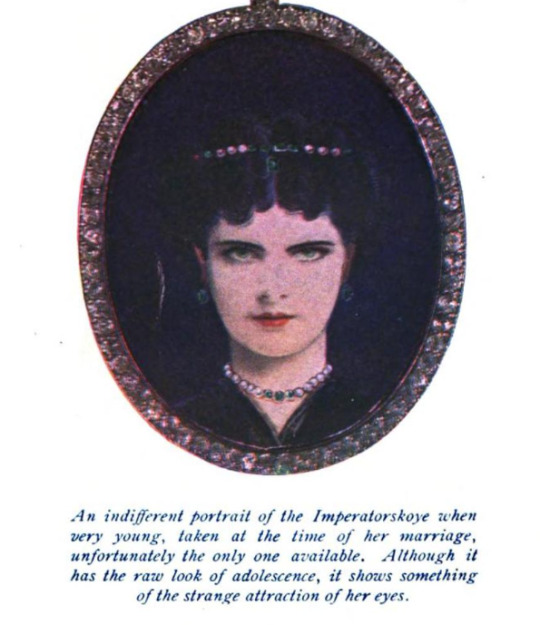
2 notes
·
View notes
Text
i might be an idiot reading too much in to what may well be a clerical error or. i might have just found a trans person - if that’s even the correct term for this period?? - from the 19th century.

so, charlotte f. was born in 1847, shows up on the census in 1851 as charlotte, daughter of the head of the house etc. but. but. by the time of their death in 1907, they’re put down as charles francis, gender is put as male, and they’re married to an eliza a. and have two daughters.

now, before you say that i’ve gotten mixed up with twins or something, i really dont think i have, unless twins also tend to die on the same day, and only one of them gets put on the census. and, although ancestry there is saying they’re two boys, rather than a boy and a girl, there is no record of charlotte past that 1851 census

by the time 1861, ten years on, charlotte has vanished, and instead we find the family’s only thirteen year old is a charles francis. charles is the name put down for every subsequent census i’ve found - 1871, 1881, 1891 and 1901. he’s also listed in the civil marriage register

and charles francis dies at the age of 59, and is put down as such in the civil index. no hint that he was anything other than a normal son, brother, father and husband

now, i can’t tell you how he’s fathered two children if my theory is correct. maybe he was intersex. maybe he and his wife understood that she needed to copulate with somebody else to reproduce. maybe she cheated. maybe they adopted. i don’t know. all i have is what i’ve shared with you: a vanishing toddler, two very, very similar names and some slanted handwriting. there may well have been a fuck up on the forms, i simply haven’t got enough information to say for sure either way. however.
however.
if i’m right. if i’m right and a family in the 19th century looked at their trans son and said yes, we will tell the record-keepers when they come that you were always here. we will keep the secret of how you began this life forever. you will grow old and have a family and never have to wear a girl’s name again.... this family had twelve children. two of them died in infancy, three in childhood. another two died in adolescence and young adulthood. five surviving children, and he was one of them. he lived. he lived a happy, normal, long life. i’m feeling very em forster there is a great unrecorded history tonight
#may speaks#queer#history#ancestry binge tag#i dont know what i was expecting to find tonight but it wasnt this#and yes i blanked out the surname because if i can somehow get doxxed by my 4x great grand uncle or smth im sure i will be#paranoia is the name of the game on the interweb
17 notes
·
View notes
Photo

Edmund C Tarbell - Three Girls Reading (1907)
26 notes
·
View notes
Photo

Edmund Charles Tarbell — Three Girls Reading, 1907.
Painting: oil on canvas.
Impressionism
Women Reading
Three Women
#edmund charles tarbell#three girls reading#women reading#impressionism#american artists#date:1907#1900s#early 20th century#20th century#domestic scenes#three#interiors#modern art#domestic life#family life
6 notes
·
View notes